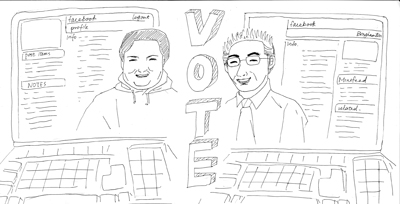
Facebook, the social networking site that dominates the lives of many college students, is now being heavily used in college government campaigning. Seeking to benefit from the Web site’s popularity, many contenders at Binghamton University have created groups for their campaigns ‘ often days before Feb. 26, when they officially entered the race.
In some schools there are set dates for when a candidate can start campaigning, but the Student Association Elections Committee has not needed to take action against any candidates.
‘The elections committee hasn’t set a rule on Facebook groups,’ said Michael Boykin, the elections committee chairman. ‘They can start as soon as they want.’
Many candidates believe that the Web site is a good way to reach students who might otherwise not be engaged in the election. Matt Landau, who is running for academic vice president, is using the Web site to get his name out to students.
‘The election is all about name recognition,’ Landau said. ‘The way these elections work is how many people know you and recognize your name on the box.’
Joe Danko, who is running for executive vice president, also believes in the importance of name recognition.
‘I feel it’s important to get my name out to as many people as possible,’ Danko said. ‘You can just go on Facebook and look at a person’s profile and see if you will vote for them.’
And on a larger campus, like BU, Facebook could also be used as a tool to gauge student opinion. For Dave Belsky, who is using his group to garner support in his run for SA president, the capacity for growth in a group’s membership can measure a candidate’s success.
‘In the past two elections it has been a good way to garner support,’ said Belsky, who has been executive vice president for the past two years. ‘It is the closest thing to polls we have on this campus.’
Although Facebook may have potential, most candidates aren’t relying entirely on the Web site. David Bass, the current vice president for multicultural affairs, who is running against Belsky, hasn’t placed too much emphasis on his Facebook group.
‘I think if you use Facebook to put a message out, that’s good,’ he said. ‘I think it’s effective if partnered with speaking with students and getting your message out there.’
In addition to the ‘official’ campaign groups, one group has been created in response to the SA elections.
The group, ‘Crave More Pie,’ whose name is a play on Belsky’s ‘Crave More Dave’ slogan, is both satirical and political; a disclaimer is included on the site, stating, ‘This group was made for all those who like to make fun of the political system,’ and the group endorses ‘Cherry Pie’ for SA president.
Cherry Pie goes on to challenge Bass and Belsky to a debate, as well as claiming a five-point lead in the ‘SA-funtime presidential election poll.’
‘From what I was told, it was started in good fun, but then resulted in insults,’ Bass said.
Belsky was not amused by the site.
‘I think it’s a bit of an insult, not only to me, but also to the entire SA election process,’ Belsky said. ‘If you don’t like the process, I suggest you run for a position and change it.’


